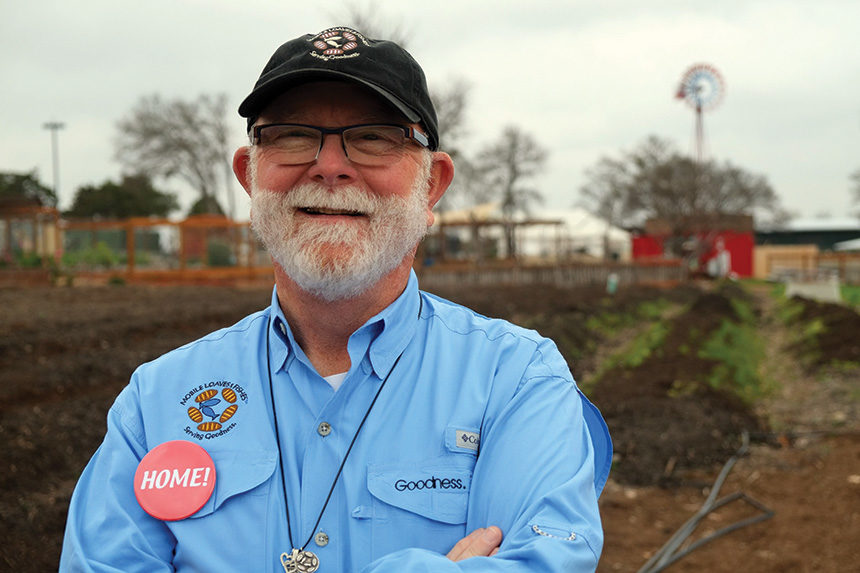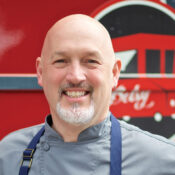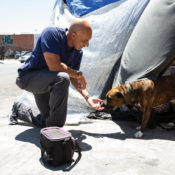On a chilly November night in 2019, Alan Graham slept on the streets of Austin, Texas. He has spent roughly 250 nights in the city’s parks and alleys over the past 15-plus years, easily identified by his black Mobile Loaves & Fishes cap and his white Hemingway beard. Graham founded Mobile Loaves & Fishes to empower the city’s homeless, and these street sessions have taught him a fundamental lesson: That housing is less important than community for solving chronic homelessness.
“The single greatest cause of homelessness is a profound catastrophic loss of family,” says Graham. “When you talk to people, that’s the common denominator. You say, ‘Tell me about your mom and dad, your brothers and sisters,’ and the train wrecks that spew out are just incredible. To me, that was the revelation. Everybody needs shelter, but more importantly, they need to be loved, and they need to be known. That’s our foundation.”
Mobile Loaves & Fishes (MLF.org) provides a social, emotional, and financial support system to the chronically homeless. Since its creation in 1998, nearly 20,000 volunteers have served more than 5.5 million meals through its Food Truck Ministry, which provides food, clothing, and hygiene products. In 2016, it launched Community First! Village, a 27-acre neighborhood of 130 tiny houses and 100 RVs that gives homeless individuals a place to live and grow. The village’s micro-enterprise program, Community Works, teaches skills such as baking, auto mechanics, jewelry-making, woodworking, and blacksmithing. Residents earn money when their products are sold (including at the village’s community markets), which helps them pay rent for their homes.
The village’s primary mission is to provide community and camaraderie, which is one reason for the tiny, 200-square-foot houses. “Living in small spaces means we come out of our homes more frequently,” says Graham. The houses only have front doors and front porches — no backyards, no back doors — which also increases interactions. And because Graham believes that food is the fuel for social interactions, the village has five outdoor kitchens, a community table, multiple barbecue pits, and locations to “hang out and break bread together,” which Graham, 64, does frequently: He and his wife Tricia live in one of the village’s tiny houses.
“If you feel a sense of grace and acceptance about who you are and where you’re at, you start extending that to others.”
“I feel like I live in the most diverse neighborhood in the United States,” he says, referring to its mix of races and LGBTQ residents. “Community First! Village is the antithesis of what you find in our suburban neighborhoods — those hermetically sealed single-family sarcophaguses that we now call the American Dream, which are actually isolating us from each other.”
Creating quasi-utopian communities for the homeless was not Graham’s life plan. A lifelong Texan, he previously worked as a real estate developer. When his wife began taking their four kids to church, he eventually joined them, and in October 1996, he attended a 30-hour men’s retreat. “Had I known that men were going to hold hands with each other, I wouldn’t have gone,” he says. “But I was blown away. I realized that I was leading a pretty superficial life and I began to ask God what He wanted me to do.”
He soon volunteered with the church and coordinated a bag lunch program for the homeless. Then he realized he could distribute more meals with a food truck, which led to the creation of Mobile Loaves & Fishes. But there was a problem: He and his partners at St. John Neumann Catholic Church had no connections with the homeless community.
“We were five white guys in an affluent neighborhood, in an affluent Roman Catholic Church, coming up with an idea that none of us really had any experience in,” he says.
A formerly homeless church custodian, Houston Flake, became their link to the streets, providing not only information about people’s needs, but helping them confront their own misconceptions and fears about homelessness. “The homeless stereotype we all hold is not pleasant — it’s mental illness and drugs and criminality,” says Graham. “Houston, who lived that life, knew differently. So he took us to places he knew.”
In South Austin, they visited a homeless woman named Marge. “It was the middle of the day and she’s drinking a beer and smoking cigarettes,” he says. “The closer we got, the more homeless she looked and the more fearful I became.” Flake approached her and Marge rose from her chair. “He gives her this phenomenal, tight, bear hug, and then plants a little kiss right on her lips. I’ll be forever grateful for that moment because I realized there was nothing to fear.”
Today, the organization’s 12 food trucks serve up to 1,200 meals a night, with an emphasis on respect: Those who serve the meals, for example, are on the same side of the counter as those who receive them. “That was a game changer in building relationships,” says Graham. Community First! Village has proven equally successful, providing residents with stability and support. The village is funded by donations and includes a clinic, addiction center, dog park, and barbershop. The average age is around 55, and some residents had been homeless for 20 to 40 years.
“This is not a fix-and-repair, send-them-out model,” says Graham. “Our success is centered on getting people off the streets, getting them into an environment where they feel settled, and allowing them to rediscover and cultivate their God-given gifts, whether it’s art, blacksmithing, landscaping, maintenance, whatever.”
One success story is Ute Dittermer. For years, Dittermer and her husband lived in a tent, moving from park to park on the outskirts of Austin. In 2015, Dittermer, a longtime artist, connected with the organization through a food truck and applied for a home in the village. She has studied pottery and ceramics at the village and her work sells for $250 to $1,000 at the community market.
Graham also wants residents “to care for others outside of themselves,” and they speak honestly about the dark turns in their lives. “[The village] offers a space to be more vulnerable, to be more real, with yourself and your neighbors,” says Earth Drum Yoo, a glassblower and member of the village’s community council. “If you feel a sense of grace and acceptance about who you are and where you’re at, you start extending that to others. This place inspires so many to be selfless. Helping people who are chronically homeless is what unites us here.”
For Graham, the work continues: He is building 200 more micro-homes on 24 acres and attempting to acquire more property. Visitors from 155 cities have traveled to Austin to observe his work, and the organization has helped launch food truck programs in six cities, including Nashville, New Orleans, Minneapolis, and San Antonio. Yet despite the success, the housing program can still provoke a not-in-my-backyard backlash.
“People say they’re all drug addicts, they’re mentally ill, they’re lazy, it’s their choice,” he says. “It’s nonsense. Nobody on the planet would ever dream of living under a bridge and being a drug addict or a prostitute. But if we can blame them for making the choice, it relieves us of responsibility for dealing with it.”
Yet Graham relishes the transformation that occurs in visitors to Community First! Village. “When they see people on street corners and under bridges, they think the problem is intractable,” he says. “And then within an hour on this property, they realize it’s not at all intractable. That’s what we do: We transform how people view the homeless.”
Ken Budd is the author of The Voluntourist and the host of 650,000 Hours, an upcoming web series and podcast on travel and real-life American heroes.
This article is featured in the March/April 2020 issue of The Saturday Evening Post. Subscribe to the magazine for more art, inspiring stories, fiction, humor, and features from our archives.
Featured image: courtesy Mobile Loaves & Fishes
Become a Saturday Evening Post member and enjoy unlimited access. Subscribe now



